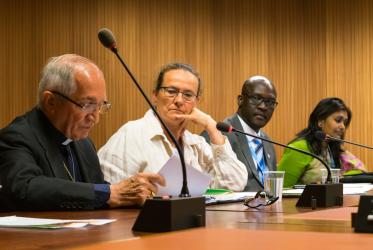Displaying 41 - 60 of 64
08 September 2016
Consultation considers right to food in context of climate change
15 December 2015
Interfaith workshop calls for justice and compassion in finance
03 December 2015
Climate pilgrimage toward COP21 pauses in Geneva
05 November 2015
Weaving together personal faith and climate change
23 September 2014
Prayers, reflections and action during “Time for Creation”
15 September 2014
Time to pray for God’s creation
02 September 2013






